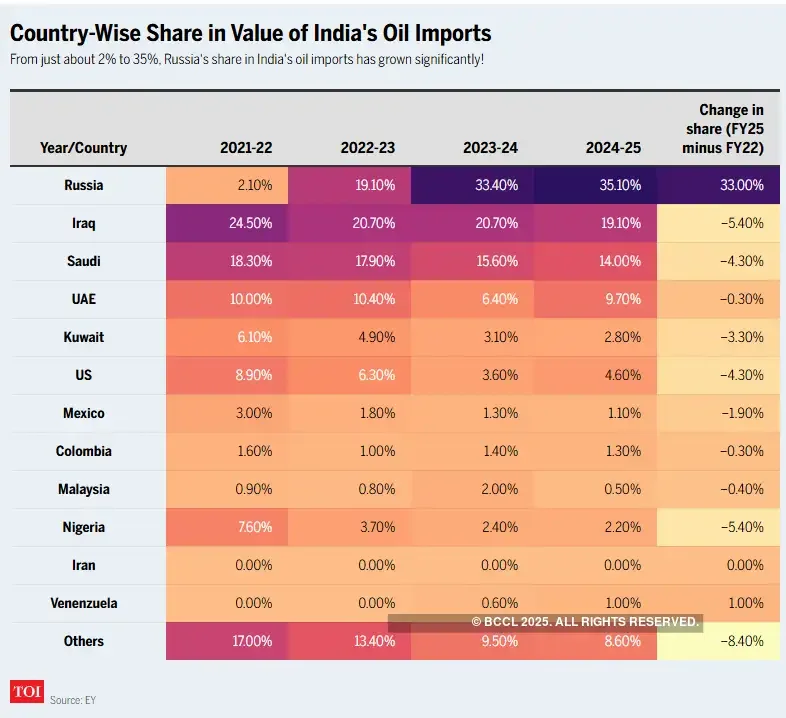International Relations
India’s Concerns on Western Sanctions on Russian Oil
- 23 Jul 2025
- 8 min read
For Prelims: North Atlantic Treaty Organization, Quad, BRICS, Shanghai Cooperation Organisation, Strategic Petroleum Reserves
For Mains: Energy Security and India’s Foreign Policy, Impact of Sanctions on Global South Economies, Geopolitical Dimensions of India’s Oil Imports
Why in News?
India has sharply criticised the proposed US Russian Sanctions Act, 2025, which threatens 500% tariffs on countries importing Russian oil and energy products.
- The move comes alongside strong pressure from North Atlantic Treaty Organization(NATO) which advised India, China, and Brazil to stop buying Russian oil or face 100% secondary sanctions.
- India accused the West of “double standards”, noting Europe still buys Russian energy while pressuring others to stop.
What are Secondary Sanctions?
- About: Secondary sanctions are a type of economic penalty that don’t directly target the country or entity violating international norms, but instead punish third parties, usually other countries, companies, or individuals that continue doing business with the primary sanctions target.
- The goal is to isolate the primary target more completely by discouraging others from engaging with them, even if those third parties aren't violating any international laws themselves.
- Key Features: They reinforce primary sanctions by closing off loopholes and discouraging workarounds.
- Secondary sanctions can impose 100% tariffs, block financial access, and restrict trade even on foreign entities not tied to the sanctioning country.
- Concerns Regarding Secondary Sanctions: They often extend the reach of one country’s laws into the affairs of others which many see as a form of economic coercion.
- Secondary sanctions can strain diplomatic ties, especially if the targeted third party is an ally.
How Significant is Russian Oil to India?
- Strategic Cushioning Amid Global Turbulence: Russian oil, sold at a discount since Western sanctions following the Russia-Ukraine war, 2022, has helped India manage inflation, stabilize its current account deficit, and reduce fuel subsidies.
- By importing discounted crude from Russia, India has saved around USD 13 billion (2022-2024).
- Rising Dependence post-2022: In FY22, Russia accounted for only 2.1% of India’s oil imports. By FY25, this jumped to 35.1%, making Russia the top supplier, ahead of West Asian sources (Qatar, UAE).
- In 2024, India imported nearly 1.9 million barrels/day from Russia, compared to just 0.1 mb/d in 2021.
Why is India Opposing the Russian Sanctions Act and NATO's Tariff Threats?
- Energy Security: India imports over 85% of its oil needs, and Russian crude has been a key source since 2022.
- Excluding Russia, which supplies 10% of global oil, could raise prices to USD 130 per barrel, causing spikes and hurting consumers.
- Double Standards by the West: India points out that many European countries still buy Russian energy, often through third countries. The EU imported 18% of its natural gas from Russia in 2024.
- India argues that the same standards are not applied to the West, questioning the legitimacy and fairness of US and NATO sanctions.
- Threat to Trade Sovereignty: The proposed 100%–500% tariffs would hit all Indian exports to the US, putting its USD 41 billion trade surplus (2024-25) at risk, especially in IT, textiles, and pharma.
- Earlier, in 2019, India had halted Iranian oil imports under similar US secondary sanctions, highlighting the pressure on its economic sovereignty.
- Negotiation Strategy: India views the sanctions threat as a pressure tactic, and is engaging with the US to voice its concerns and seek waivers or exemptions from proposed tariffs.
What Strategies can India Adopt to Ensure Energy Security Amid Geopolitical Pressure?
- Diversification of Energy Imports: India now sources crude from 40 countries, up from 27, with rising imports from the US and Brazil.
- It is also increasing oil shipments from Saudi Arabia, Iraq, and African nations to reduce dependence on Russia.
- India should strengthen ties with the Quad, BRICS, and Shanghai Cooperation Organisation (SCO), SAARC and BIMSTEC for energy resilience.
- It must also use platforms like the G20 and strategic dialogues (e.g., 2+2 meetings) with the US and EU to seek sanctions waivers.
- Build Strategic Oil Reserves: Accelerate expansion of India's Strategic Petroleum Reserves (SPR) to act as a buffer during global supply disruptions.
- Sign forward-looking agreements with reliable suppliers for consistent delivery at predictable prices.
- Boost Domestic Energy Production: Increase investment in domestic oil and gas fields through policy support and public-private partnerships. Scale up ethanol blending, biofuels, and hydrogen production to reduce crude oil reliance.
- Continue large-scale deployment under the National Solar Mission and green hydrogen initiatives. Improve storage and transmission infrastructure to support renewable integration.
|
Drishti Mains Question: India flags the West for “double standards” in energy trade with Russia. Analyze this criticism and its relevance in shaping India's geopolitical stance. |
UPSC Civil Services Examination, Previous Year Questions (PYQs)
Prelims
Q.1 With reference to furnace oil, consider the following statements: (2020)
- It is a product of oil refineries.
- Some industries use it to generate power.
- Its use causes sulphur emissions into the environment.
Which of the statements given above are correct?
(a) 1 and 2 only
(b) 2 and 3 only
(c) 1 and 3 only
(d) 1, 2 and 3
Ans: (d)
Q.2 The term ‘West Texas Intermediate’, sometimes found in news, refers to a grade of (2020)
(a) Crude oil
(b) Bullion
(c) Rare earth elements
(d) Uranium
Ans: (a)
Mains:
Q. The question of India’s Energy Security constitutes the most important part of India’s economic progress. Analyse India’s energy policy cooperation with West Asian countries. (2017)
Q. “Access to affordable, reliable, sustainable and modern energy is the sine qua non to achieve Sustainable Development Goals (SDGs)”.Comment on the progress made in India in this regard. (2018)







